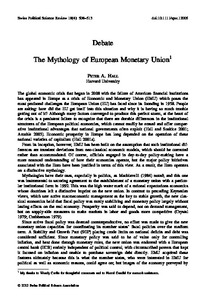The mythology of European Monetary Union

Swiss Political Science Review
2012
18
4
508-513
ECB ; economic policy ; economic recession ; EMU
EMU and International monetary system
http://dx.doi.org/10.1111/spsr.12005
English
Bibliogr.
"The global economic crisis that began in 2008 with the failure of American financial institutions has appeared in Europe as a crisis of Economic and Monetary Union (EMU) which poses the most profound challenges the European Union (EU) has faced since its founding in 1958. People are asking: how did the EU get itself into this situation and why it is having so much trouble getting out of it? Although many factors converged to produce this perfect storm, at the heart of the crisis is a persistent failure to recognize that there are durable differences in the institutional structures of the European political economies, which cannot readily be erased and offer comparative institutional advantages that national governments often exploit (Hall and Soskice 2001; Amable 2003). Economic prosperity in Europe has long depended on the operation of these national varieties of capitalism (Hall 2001a).
From its inception, however, EMU has been built on the assumption that such institutional differences are transient deviations from neo-classical economic models, which should be corrected rather than accommodated. Of course, officials engaged in day-to-day policy-making have a more nuanced understanding of how their economies operate, but the major policy initiatives associated with the Euro have been justified in terms of this view. As a result, the Euro operates on a distinctive mythology. ..."
Digital
The ETUI is co-funded by the European Union. Views and opinions expressed are however those of the author(s) only and do not necessarily reflect those of the European Union or the ETUI.